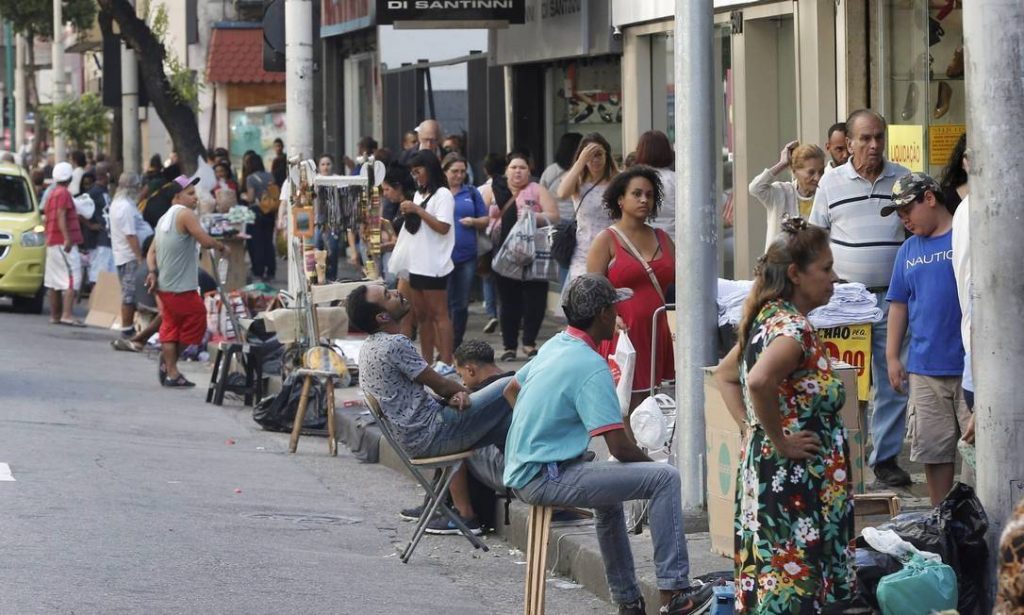RIO DE JANEIRO, BRAZIL – Daiane dos Santos owns a hair salon in one of the largest favelas in São Paulo, now closed for a month because of the pandemic; she is one of the 38 million casual workers in Brazil waiting for the pledged government aid.
“The four of us are in quarantine and are now starting to experience some financial limitations,” she said, referring to her two children and her unemployed husband, with whom she lives in Paraisópolis, a favela in the southern sector of São Paulo that is home to some 100,000 people.

There has been no income in the household for almost a month. “My husband was fired from his job a few weeks before this crisis began,” she explained.
Now her hope lies in the Jair Bolsonaro government’s commitment to provide a grant of R$600 (US$120) for three months to all casual workers, who represent just over 40 percent of the country’s total workforce, some 38 million people.
This Bolsonaro government initiative, also directed at the self-employed, could benefit more than 50 million Brazilians – a quarter of the population who lost their income as a result of social isolation measures to prevent the spread of Covid-19 in the country.
The money was released last week to 2.5 million registered casual workers on the Caixa Econômica Federal (Federal Savings Bank) website.
But like Daiane dos Santos, several thousand workers have not yet received the aid because their application, a week later, is still “under review”.
Lorraine Alves Meneses, another Paraisópolis resident who ceased to work as a housemaid in late March, when the state of São Paulo began quarantining, is another such case.
“Before the advent of the coronavirus we lived well. I didn’t have money every day, but I did at least twice a week,” recalled Lorraine Alves, mother of three children, aged six, seven and nine.
According to the woman, “there is still no lack of food at home, thank God,” but she says she is worried about being unable to pay her rent, “which is already late”.
The R$600 aid “doesn’t help much, but at least it makes things a little easier,” she said, so she hopes to receive this relief aid soon.
Nilsa Maria Ferreira, another resident in the community, could not even register on the government’s digital platform.
“It tells me that my CPF (Natural Persons Register) is registered as irregular,” she complained to Brazil’s fiscal authority, where she needs to have her situation cleared up in order to have access to government economic aid, but which is often blocked due to lack of information, among other reasons.
The 43-year-old woman does not have an account at any bank, although this is not a requirement to receive the R$600.
Nilsa Ferreira, living in Paraisópolis with one of her daughters and her grandson, has mainly engaged in the collection of recyclable materials, although she also worked on “a little bit of everything,” as she said.
“I had a great life. I would get up at 6:30 in the morning and go to work until I returned at six in the afternoon”, but with the coronavirus “everything changed altogether”, she reported.
“Now it’s not worth going out to the streets because everything is closed, the stores, construction is stopped, and I rely on it to work and earn my money”, she said.
In a country marked by high unemployment and poverty and considered one of the most unequal in the world, the crisis caused by the pandemic has added uncertainty to the concerns over a widening social gap that currently exists.
According to the latest data from the Getulio Vargas Foundation, in 2018 the number of upper and middle class families (the so-called A and B classes) in Brazil had grown, reaching 14.4 percent of the country’s population.
The largest social class, known as C class, remained relatively stable, representing 55.3 percent of the population, while the poorest groups, consisting of D and E classes, suffered a slight increase, covering 30.3 percent of Brazilians.
Thus the Covid-19 pandemic is a major menace for those living in extreme poverty, on only R$145 a month (less than US$30), which in 2018 was 13.5 million people, according to the Brazilian Institute of Geography and Statistics (IBGE).
Globally, the Covid-19 pandemic has already caused more than 157,000 deaths and infected over 2.2 million people in 193 countries and territories. More than 497,000 patients have been cured.
To fight the pandemic, governments have sent 4.5 billion people (more than half the planet’s population) home, shut down non-essential trade and drastically reduced air traffic, paralyzing entire sectors of the global economy.
On Friday, April 17th, Brazil reached a daily record of 217 deaths and 3,257 new cases of infection with the novel coronavirus, totaling 2,141 deaths and 33,682 infections since the pandemic reached the country.

